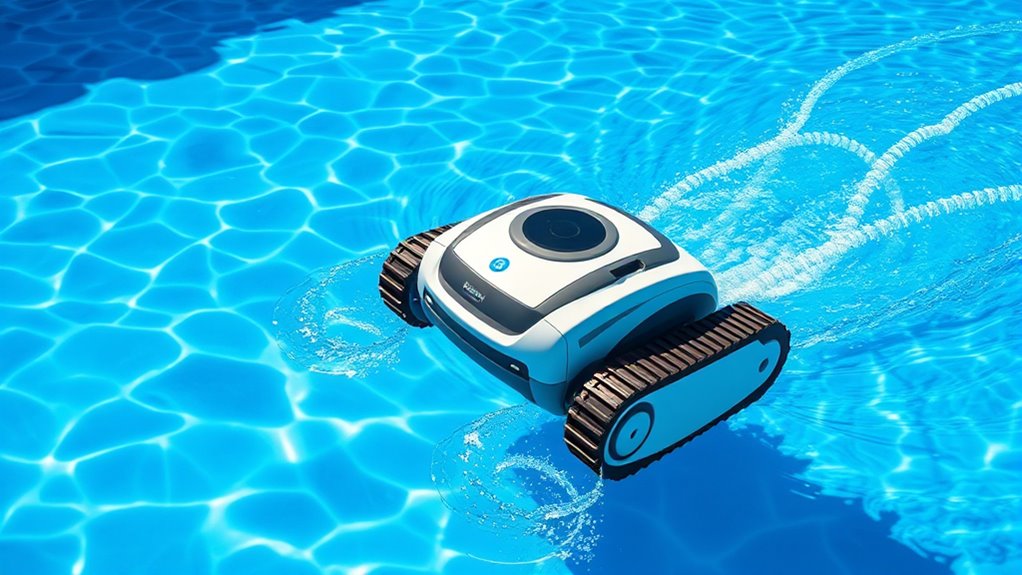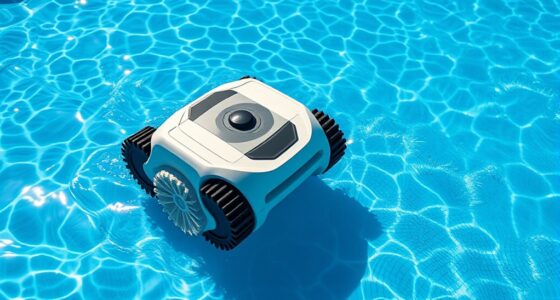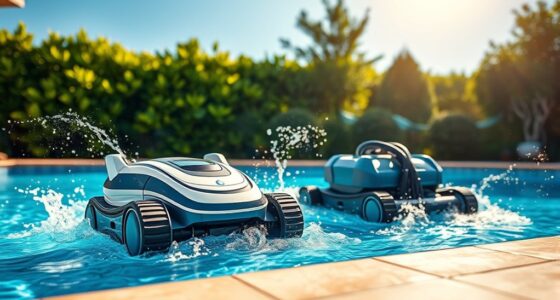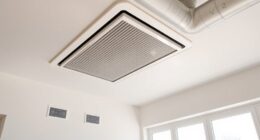Pressure pool cleaners use water pressure from your pool’s filtration system to move around automatically. They connect directly to the return line, harnessing the flow to propel themselves across the surface. The vortex technology creates swirling motion, helping lift debris like leaves, twigs, and dirt more effectively. They operate without batteries or external motors, making them simple and efficient. If you want to understand exactly how these cleaners cover your pool and handle different debris, keep exploring the details.
Key Takeaways
- Pressure pool cleaners use water pressure from the pool’s filtration system to move and operate.
- They generate a spinning, swirling motion through vortex technology, enhancing debris lifting.
- The cleaners automatically navigate the pool surface, covering all areas evenly.
- They connect directly to the pool’s return line, requiring no external power or batteries.
- These cleaners efficiently remove debris, including leaves and dirt, minimizing clogs and missed spots.
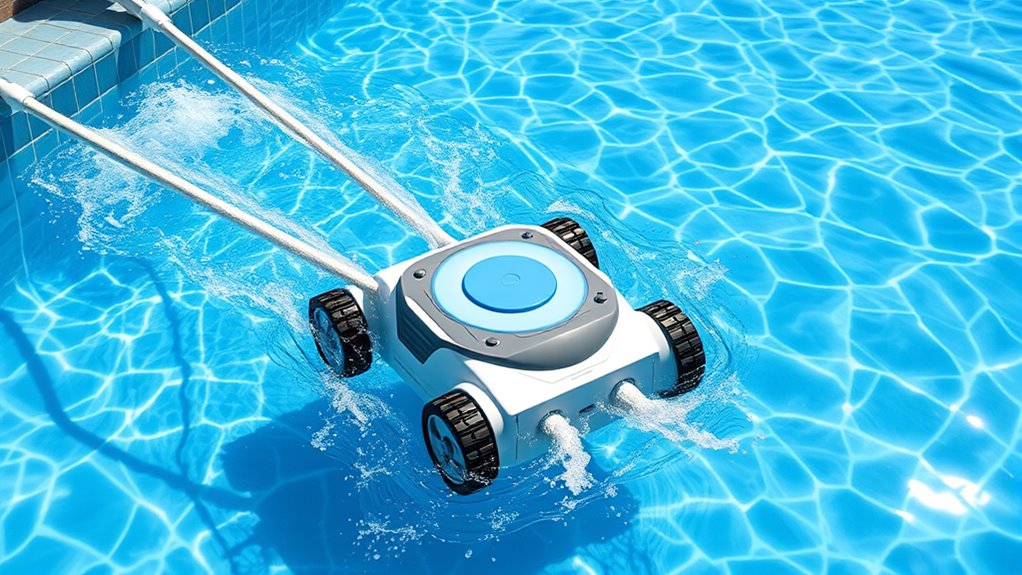
Are pressure pool cleaners the right choice for keeping your pool spotless? If you’re looking for an efficient way to maintain a clean and inviting swimming area, these devices could be just what you need. Pressure pool cleaners operate by harnessing the power of water pressure from your pool’s filtration system. As water flows into the cleaner, it propels the device around your pool, allowing it to cover the surface thoroughly. One of the key features that make these cleaners effective is vortex technology, which enhances debris removal and ensures even the most stubborn debris gets swept away.
Vortex technology works by creating a spinning, swirling motion inside the cleaner, which generates strong suction and momentum. This design helps lift dirt, leaves, and other debris from the pool floor and walls, pulling them into the cleaner’s debris bag or filter. Unlike basic pressure cleaners, those equipped with vortex technology can handle larger debris more efficiently, reducing the likelihood of clogs or blockages. This means you spend less time cleaning out the device and more time enjoying your pool.
When it comes to debris removal, pressure pool cleaners excel because they are designed to target various types of debris. They’re particularly good at picking up larger items like leaves, twigs, and acorns, which often clutter the bottom of pools. Smaller debris, such as dirt or algae, is also effectively removed thanks to the consistent water flow and powerful suction. As the cleaner moves around, it automatically adjusts its path to cover the entire pool surface, minimizing missed spots and dead zones. Some models even come with adjustable settings, so you can customize the cleaning pattern based on your pool’s specific needs.
Another advantage of pressure pool cleaners is their simplicity of design and ease of use. They typically connect directly to your pool’s existing return line, making installation straightforward without complicated wiring or programming. Once set up, they operate automatically, saving you time and effort. Plus, because they rely on your pool’s filtration system for power, they don’t need an external motor or batteries, which reduces maintenance and potential points of failure.
Frequently Asked Questions
Can Pressure Pool Cleaners Handle Large Debris Effectively?
Pressure pool cleaners can handle large debris effectively thanks to their high suction power and debris capacity. You’ll find that they’re designed to pick up bigger leaves or twigs without clogging, making your cleaning easier. Just make certain your cleaner has a strong suction and sufficient debris capacity, so it can efficiently manage large debris without frequent stops. This way, you keep your pool spotless with less effort.
How Often Should I Run My Pressure Pool Cleaner?
You should run your pressure pool cleaner about once a week to keep your pool pristine. Proper pool chemical balance is essential for effective cleaning and preventing algae, while pool safety features ensure safe operation. Regular use helps remove debris and dirt, maintaining water clarity. Adjust the frequency if you notice more debris or after heavy storms. Consistent cleaning supports overall pool health and safety, making your swimming experience enjoyable.
Do Pressure Pool Cleaners Work With All Pool Types?
Pressure pool cleaners work well with most pool types, but your success depends on maintaining proper pool chemical balance and considering your pool surface types. They are effective on in-ground concrete, vinyl, and fibreglass pools, but some surfaces may require specific adjustments. Guarantee your pool’s chemical levels are balanced for ideal cleaning. You might need different nozzle settings or pressure adjustments based on your pool surface to achieve the best results.
Are Pressure Pool Cleaners Energy-Efficient?
Ever wondered if pressure pool cleaners are truly energy-efficient? You might be surprised to learn that they often consume less energy than traditional cleaners. Their eco-friendly operation reduces energy consumption, helping you save on electricity bills while keeping your pool spotless. With innovative designs, these cleaners balance powerful cleaning with sustainability, making them an excellent choice for eco-conscious pool owners. Now, you can enjoy a clean pool without guilt or high energy costs.
What Maintenance Is Required for Pressure Pool Cleaners?
To keep your pressure pool cleaner working efficiently, you need to perform regular maintenance. Check and clean the filter regularly to prevent clogs, and inspect the pump to guarantee it’s operating smoothly. Replace worn-out hoses or brushes as needed, and keep an eye on the pressure levels. Consistent filter maintenance and pump inspection help extend your cleaner’s lifespan and maintain ideal cleaning performance.
Conclusion
Now that you know how pressure pool cleaners work, you can see they’re like trusty underwater explorers, tirelessly scouring your pool’s depths. They use the power of pressurized water to sweep away dirt and debris, making your cleaning routine easier. With their clever design and efficient operation, they turn a tedious chore into a breeze. So, let your pool’s cleanliness sail smoothly, thanks to these hardworking devices that keep your water crystal clear.
